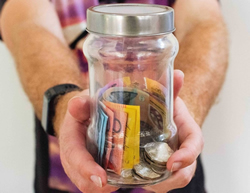Jess Commons* harnesses to power of community to uncover new ways to save.
 The older (and more money savvy) I get, the more I realise that saving money is all about playing Current You (an impulsive, reckless maniac) so that Future You (the grown-up, best adult version of yourself) will reap the benefits.
The older (and more money savvy) I get, the more I realise that saving money is all about playing Current You (an impulsive, reckless maniac) so that Future You (the grown-up, best adult version of yourself) will reap the benefits.
It’s because of this that I put my savings into a separate account on the day I get paid so that Current Me can’t impulse buy homewares with money that Future Me will one day want to buy a car.
It’s also because of this that I take $1 a day (Current Me would never notice such a trivial amount) and put it in a fund that Future Me will one day be able to use to finally book a post-pandemic trip without eating into my monthly spending allowance.
Our readers are obviously pros at this kind of thing and have plenty of tips on how to do it.
Scroll through for the best advice they have for saving money.
Forget your wallet
Leaving my wallet at home when I go to the gym, for a walk or even to the office so I don’t spend money on snacks that I don’t really want or pick up stuff on the go.
In this case, no money on me = the safer [my] money will be.
–Dayana
Imagine cost per use
I only buy clothes if I can see myself wearing it at least 30 times.
May sound stupid or too few times but it works! This means I usually buy better quality now because I prioritise long-lasting items.
Also never, ever buy anything full price.
Sales and charity shops are a lifesaver.
–Julieta
Pretend you’re running out
I buy all my clothes on eBay, I only get my hair cut by a student or recent grad on discount days, buy clothes and shoes that will last, not rubbish from cheap shops.
And this sounds stupid but I use all my makeup and beauty products as though I hardly have any left.
Makes it last longer.
–Joanna
Remember browsing is not a hobby
Avoid shopping temptation.
Don’t even browse.
Don’t go onto online stores and look through their products to see if there’s something you want.
Unsubscribe from all the tempting emails.
Window shopping is not a hobby — get a real one so you have something else to do with your downtime.
When tempted, remind yourself that this is an ethical choice as well as one that suits your bank account!
–Julianne
Write it down
Write down everything I spend as makes me realise how it all adds up.
Have a wish list for non-essentials instead of buying straight away.
–Christine
Save $2 coins
I save my coins in a pot, and then deposit them in the bank every few months.
It’s surprising how quickly they add up!
–Ninana
Give yourself an allowance
I have two current accounts: one that I get paid into and the other that I actually use.
I transfer myself $100 a week into that and only [take] that card out with me to give myself an allowance.
–Laura
Only spend what you can earn
I challenged myself to not spend any ‘new’ money on clothes, only using the funds from old stuff I was selling to fund any new purchases that way it’s all kind of circular!
—Emma
Start a ‘nice things’ fund
I take money out on payday and that is what I use for my ‘nice’ things e.g. lunch at work, out with friends, and try to stick to $50 a week.
Anything leftover at the end of the week goes into a piggy bank for holidays.
–Harriet
Only use cash
Only buy things with cash (when feasible).
Withdraw a set amount on Monday morning that has to last the week.
Transfer all money left in your current account the day before payday into your savings account.
–Valentina
Measure cost in work not money
I always imagine the cost of something in the number of hours I had to work for the money.
Is this new dress worth three hours’ work? Is this taxi worth an extra hour at work?
I feel like this stops me from spending on stupid stuff I don’t need.
–Kimberley
Put the shopping basket on hold
If I think I want something online shopping, I add it to my basket and come back to it a week later.
I’ve usually decided by then that I don’t need it.
–Elise
Hide your pay rise
Put any pay rise you get into a separate savings account straightaway each month, so you don’t notice the impact of the rise and subconsciously allow for it in the way you spend (aka get any lifestyle creep).
So if you usually do certain per cents of your wage into different pots, don’t do this for the amount over your first pay rise and instead put that amount into a separate pot.
–Rose
*Jess Commons is Managing Editor at Refinery 29 UK.
This article first appeared at refinery29.com.











